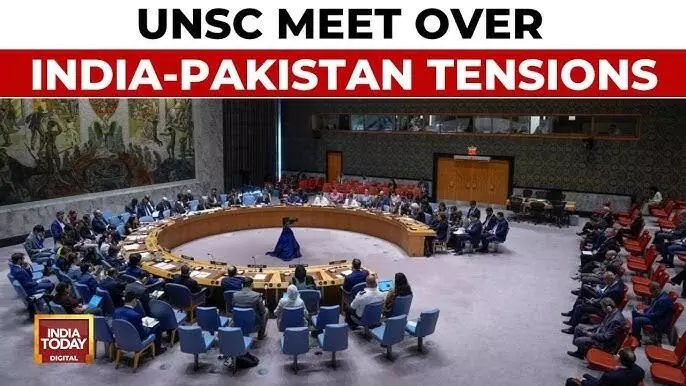The UN Security Council's Dilemma: Navigating India-Pakistan Tensions Post-Pahalgam Attack

In the wake of the tragic Pahalgam terror attack that claimed 26 innocent lives, the United Nations Security Council (UNSC) convened closed-door consultations to address the escalating tensions between India and Pakistan. While this meeting was significant, the outcome was predictable—an absence of concrete resolutions or statements. Shashi Tharoor, a Congress MP and former diplomat, highlighted the limitations of the UNSC in effectively addressing the complex issues at hand. He stated, 'I am quite confident that the Council will not pass a resolution criticizing Pakistan because China will veto it.' This sentiment underscores a frustrating reality: the UNSC often finds itself paralyzed by geopolitical alliances.
Real-world examples can illustrate how these diplomatic stalemates occur. In various instances, meetings convened to address urgent conflicts have ended without any meaningful outcomes. For instance, a previous UNSC meeting focused on Kashmir ended similarly, showcasing a pattern where geopolitical interests overshadow genuine efforts for peace. The Pahalgam attack, attributed to the Pakistan-based terror group Lashkar-e-Taiba, has only intensified scrutiny on Pakistan's role in regional instability. Tharoor noted that during the recent consultations, some Council members posed tough questions to Pakistan regarding its involvement in terrorism, indicating that global sentiments may be shifting.
The UNSC's inability to issue a decisive statement highlights a critical challenge in international diplomacy: balancing accountability while navigating political alliances. As emphasized by the UN Secretary-General António Guterres, targeting civilians is unacceptable, and those involved in such acts must be held accountable. However, in the complex world of diplomacy, the path to accountability often becomes entangled with national interests and alliances.
Looking ahead, it seems that the most likely outcome from the UNSC will be a vague call for peace and dialogue rather than any actionable measures. Tharoor pointed out that any formal resolution is unlikely, as many member nations would resist taking a definitive stance against either India or Pakistan. Instead, the Council may opt for an informal statement that acknowledges the need for restraint without assigning blame.
This situation raises questions about the effectiveness of the UNSC in addressing ongoing conflicts. Are the member nations more interested in maintaining their geopolitical alliances than in pursuing genuine peace? The Pahalgam attack serves as a reminder of how quickly tensions can escalate, underscoring the need for robust dialogue and accountability mechanisms. As India continues to seek justice for the victims, including the implementation of punitive measures against Pakistan, the international community must also play its part in facilitating constructive conversations.
In conclusion, the UNSC's recent meeting on the Pahalgam attack and the subsequent India-Pakistan tensions has shed light on the complexities of international diplomacy. While the world waits for a resolution, it is crucial to recognize that lasting peace will require more than just discussions; it demands a concerted effort from all parties involved. The tragic events serve as a stark reminder that in the realm of global politics, the stakes are incredibly high, and the need for meaningful dialogue has never been more urgent.
